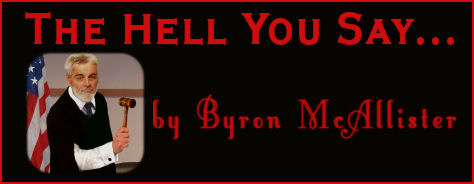 |
A Couple of Comments on the Media Today I noticed an item in our newspaper with a headline that referred to what it called a “sell-off”' on Wall Street. The term is also wide-spread on radio (including NPR, my usual) and on TV (including PBS, my usual). As always, curiosity about what was being said led to what I like to regard as contemplation: if there was really a “sell-off,” wasn't there somebody who bought what was being sold? If so, could the circumstance also be called a “buy-in”? But then I got to thinking less about what the terminology “sell-off” itself means than about what the use of that terminology means. I think it means first of all that the big boys who dominate Wall Street had decided to sell quite a lot of their stock before the price dropped (although of course the selling immediately did cause the price to drop, which then triggered further selling). But that's still what the terminology itself is meant to convey. But then, I think the fact that they used the words also tells us something. I think it means that the writers for the newspapers----and for the other media----look at matters not at all from the point of view of the people who bought the stock as the price went down (were they suckers, perhaps?), but rather exclusively from the point of view of the people who were selling it. Far would it be for the news-folks (especially my favorites at PBS and NPR) to admit that their view is one-sided. Still, I think their terminology reveals that, yes, it is. I'm aware of the right-wing notion that “the media are liberal dominated,” but it's not clear to me why liberals would look at things from the point of view of the richest capitalists Unless, of course, they simply don't realize that they are doing so. This led me to think back over other subtleties in how the news is presented. For a first example, our local newspaper, which regularly prints letters to the editor that charge it with being part of the liberal media, recently printed lots of material on certain candidates running in the primary election, which, at the time of revising this, has now happened. This year the Republicans have two or more candidates running for most primary slots, while the Democrats have, with one exception, at most one candidate per slot. (The county tends to vote conservative, so the Dems are actually lucky to have that many.) The paper prints articles comparing the several Republicans, but saves newsprint and ink by not mentioning the Democrats. Perhaps the idea is that we know who will win the Democratic contests, so that information about these lonely candidates isn't important. On the other hand, both parties (and the newspaper) are perfectly aware of a thing called “name recognition,” i.e. a tendency for people who haven't followed policy matters to vote for folks whose names they are most familiar with. Presumably the editors, whose impartiality is frequently asserted and may even be genuine, haven't thought of the effect on the November elections their unbiased articles will have. But just because they didn't think of it doesn't mean it won't happen, so in effect, they are less free from bias than they would like to appear Don't go away: I'm not through yet. Let's talk about radio and television news. Here's something I've noticed: when an idea comes from the Obama administration, they put a person on to represent and explain it to us. Now, any idea, whether from the White House or anywhere else, will run into a certain amount of opposition. The opponents are seldom united in the reasons for their dislike of the idea, but they do have strong opinions against it. In order to be fair to all of them, or at least in order to appear fair, the networks have to put on a representative of each of the most outstanding opposing points of view. Logically enough, they let the proponent go first. Then we hear from the opponents, one by one. What impression does that leave? Well, of course, it suggests that a majority of the “talking heads” oppose the idea, which, therefore, is more likely to appear to those of us who only partly understand it not to be a good one. As a side benefit for the opposition, the opinions of the detractors are nearly always, the ones heard last, which makes their arguments the ones that a good many people remember. Again, I have no idea that the network bigwigs intend to be unfair, or even that they recognize the existence of a presentation problem. (Yes, I've heard of networks that are deliberately dishonest, but those tend to show their bias so blatantly that only citizens whose opinions are already those of the networks are impressed, so they're part of an entirely different problem.) Is there a moral there for mystery writers? Sure there is: you can lead readers astray (“red herring” style, perhaps) by choosing misleading terminology, and by packing in a lot of shrewd but erroneous analysis whenever a genuine clue pops up. If you're like the not-really-particularly-liberal-dominated media, you may already be doing that, accidentally. If not, think about it. We'll defer my discussion of web sources of news and the fact that, especially in blogs, distinguishing shrewd analysis and true information from opinionated and false stuff is a messy and annoying task. We'll come back to that---when I finally acquire the patience and free time needed to read more of those unrestrained and usually irresponsible announcements. See you then. |
|
|
Past issues and stories
pre 2005.
Subscribe to our mailing
list for announcements.
Submit your work.
Advertise with us.
Contact us.
Forums, blogs, fan clubs,
and more.
About Mysterical-E.
Listen online or download
to go.
|
|
|
 |
 |

